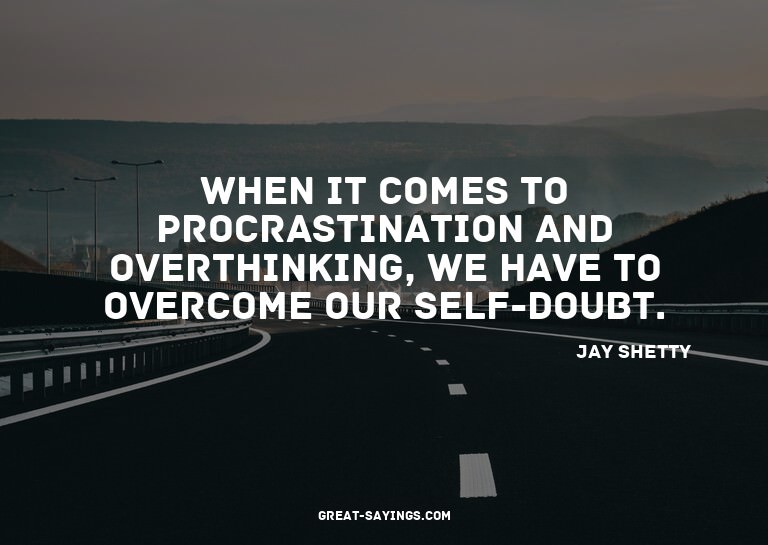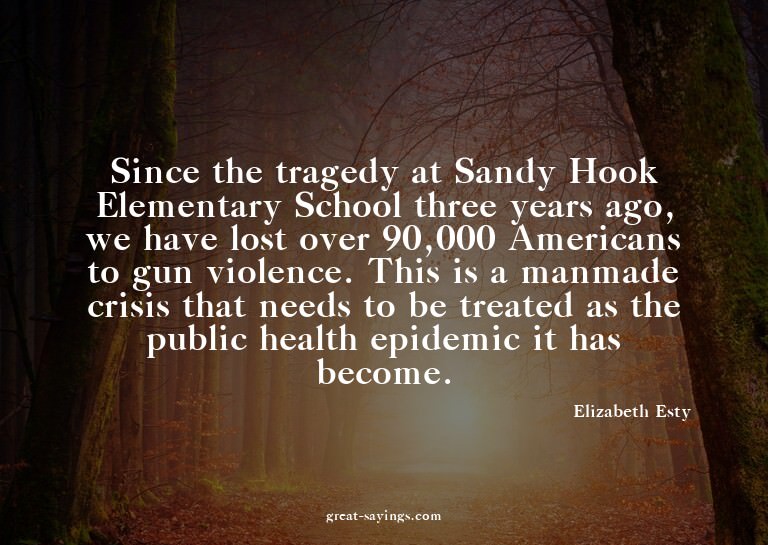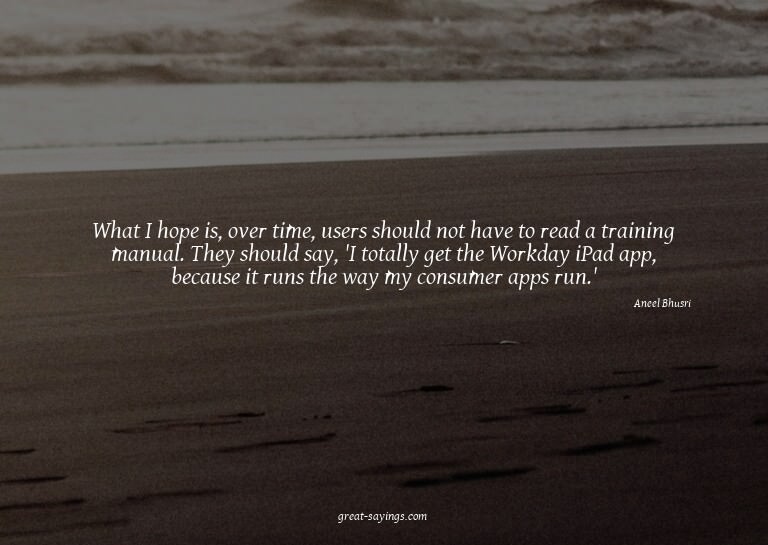Words matter. These are the best Financial Markets Quotes from famous people such as Porter Stansberry, Bob Diamond, Adena Friedman, Christine Lagarde, Robert F. Engle, and they’re great for sharing with your friends.
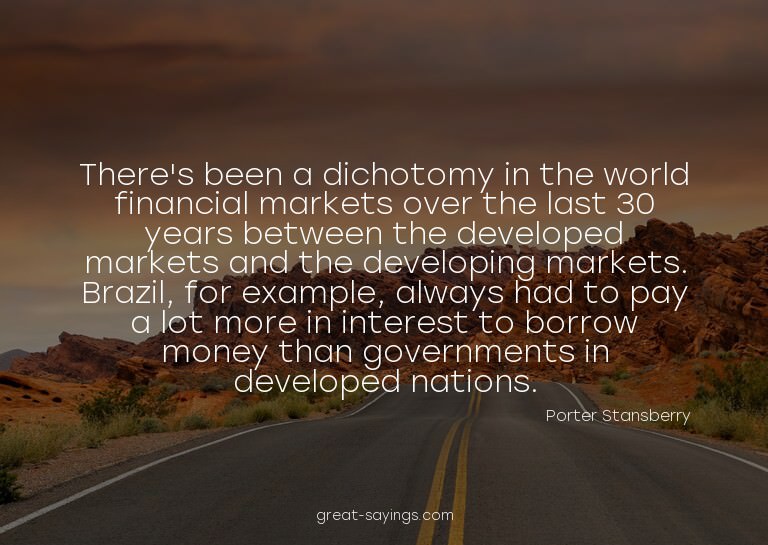
There’s been a dichotomy in the world financial markets over the last 30 years between the developed markets and the developing markets. Brazil, for example, always had to pay a lot more in interest to borrow money than governments in developed nations.
You shouldn’t be trying to create a system where no bank fails, but you should be creating one that catches a bank and allows it to fail without impacting the financial markets.
To be the best CEO you can be, you have to be passionate about the business you’re running. And I have true passion for the financial markets and the financial industry.
I do believe women have different ways of taking risks, of ruminating a bit more before they jump to conclusions. And I think that as a result, particularly on the, on, you know, on the trading floor, in the financial markets in general, the approach would be different.
I was convinced that the trading frequency measured a fundamental heartbeat of financial markets. Clearly it reflected the flow of information. It turns out also to be closely related to measures of liquidity.
Remember that all financial markets are filled with good but not necessarily innocent people looking after their own self-interests before they look after yours.
Without doubt, timely and democratic access to financial and market information contributes to smoothly functioning financial markets.
The reality is that financial markets are self-destabilizing; occasionally they tend toward disequilibrium, not equilibrium.
There is clear empirical evidence that the response of EME financial markets to different shocks, including changes in U.S. interest rates, depends importantly on the state of economic fundamentals in the EMEs themselves.
Forecasts vary in horizon, from a few seconds up to a few days in financial markets, compared to from one to several months for macro variables. We have to provide uncertainty intervals around the central forecasts to indicate the extent to which we are unclear about the future.
If we leave the European Union, there will be an immediate economic shock that will hit financial markets. People will not know what the future looks like.
The crisis in Europe has affected the U.S. economy by acting as a drag on our exports, weighing on business and consumer confidence, and pressuring U.S. financial markets and institutions.
Our economy is increasingly dependent on the success and integrity of the financial markets.
The principal linkages between Japan and the U.S. global economies are trade, financial markets, and commodity markets.
Taming the financial markets and winning back democratic control over them is the central condition for creating a new social balance in Germany and Europe.
The thing about innovation in financial markets is they’re always building on what has come before. It’s a natural process.
I had always been interested in markets – specifically, the theory that in financial markets, goods will trade at a fair value only when everyone has access to the same information.
Dan Loeb has become a billionaire searching out value in financial markets.
We live in an age of great jitteriness in the financial markets. And there’s no doubt at all, I think, that the volume of computer-traded stocks has helped contribute to that.
There is a valid nationwide sentiment of concern over public pensions, and poor funding ratios are viewed negatively by financial markets.
Our financial markets work best when they are competitive, fair, and transparent.
I don’t want to talk about the regulation of financial markets because that is not my sphere of expertise. It’s a very complicated topic, and if I have written a number of books they are always on topics that I think I know something about.
Ultimately savings have to go somewhere and I think they will find their home in financial markets and within financial markets, a large part in equity.
The fierce battles between New Democrat centrists and old-style liberals that defined the Democratic Party in the 1990s are long gone, with the party unified behind Barack Obama’s economic agenda of universal health care, expensive federal programs and more regulation of the financial markets.
It is vital for officials and regulators to have input from people within our businesses who understand the intricacies of how financial markets operate and the consequences of certain policy decisions.
The efficiency, credibility, and liquidity of the financial markets have been foundational to the largest economy in the world.
We are all socialists now, it seems. John McCain, David Cameron and Gordon Brown attack bankers’ irresponsible behaviour and salaries, and call for state intervention in the financial markets. But these calls will not get them elected or re-elected if they are addressed only to the banking sector.
Upon graduation, believe it or not, I had no job. I had no interviews. I had no prospects. I had no worries. What I did have, I had passion. I had enormous passion. I had passion for financial markets. I had fallen in love with financial markets.
For me, the real thing is make, serve and list in India. Which means we need manufacturing, we need services, and we need financial markets.
As financial markets continue to broaden and deepen, the behavior of asset prices will play an important role in the formulation of monetary policy going forward, perhaps a more important role than in the past.
Some things never change – there will be another crisis, and its impact will be felt by the financial markets.
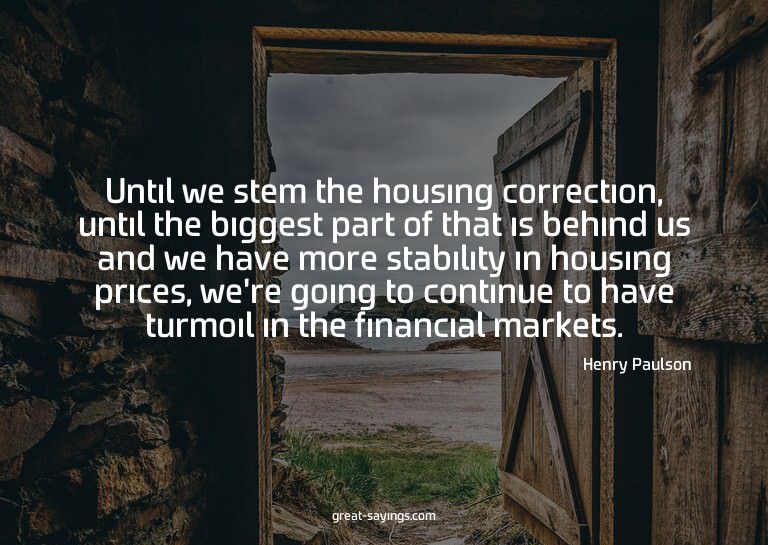
Until we stem the housing correction, until the biggest part of that is behind us and we have more stability in housing prices, we’re going to continue to have turmoil in the financial markets.
The financial markets generally are unpredictable. So that one has to have different scenarios… The idea that you can actually predict what’s going to happen contradicts my way of looking at the market.
Making economic policy isn’t a popularity contest, especially when financial markets are in a panic.
There are good reasons why we don’t want everyone to learn nuclear physics, medicine or how financial markets work. Our entire modern project has been about delegating power over us to skilled people who want to do the work and be rewarded accordingly.
The new social question is: democracy or the rule of the financial markets. We are currently witnessing the end of an era. The neoliberal ideology has failed worldwide. The U.S. movement Occupy Wall Street is a good example of this.
In the same way that some magazines have made financial markets accessible to people who don’t want that much sophisticated information, we would like to make information about public issues accessible in a way that makes people feel included.
In Asia, a lot of successful economies that had been living on their own saving, decided to open up their financial markets to international capital in the early 1990s. So here were countries doing quite well, but they decided they’d borrow a bit more and do even better.
Selling drug secrets violates a trust that is fundamental to the integrity of both scientific research and our financial markets.
There are no free financial markets in America or, for that matter, anywhere in the Western word, and few, if any, free markets of any other kind.
There are still deep-seated structural problems that threaten the economic balance in the world: Between the United States and China, for example, but also within Europe. We have taken a few steps toward taming the financial markets, but we haven’t come nearly far enough to rule out a repetition of the crisis.
A second reason why science cannot replace judgement is the behavior of financial markets.
Reasonable regulations are essential to protect consumers from harmful practices and ensure that consumer financial markets operate in a fair, transparent, competitive manner.
The United States has the most sophisticated financial markets in the world, which does not leave much room to maneuver. But it also offers investors the greatest access to information and the ability to execute trades quickly and efficiently. So it is a mixed bag of opportunity.
Rather than waiting for a crisis to erupt before intervening, the IMF should provide ‘forward guidance’ on how it will tackle potential disruptions in international financial markets.
I would say that financial markets are very inefficient, and capable of extremes of being completely dysfunctional.
The middle and working classes are paying the debt that the financial markets created.
Business chief executive officers and their boards succumb to the pressures of the financial markets and their fears of takeovers and pour out their energies to produce quarterly earnings – at the expense of building their companies for the long term.
Let us not be defeated by the tyranny of the world financial markets that threaten peace and democracy everywhere.
Things like the financial markets – a proper grounding in mathematics could help the common man. I believe that if people are more familiar with mathematical concepts… it can help deal with modern life, which is increasingly complex.
Pages: 1 2


